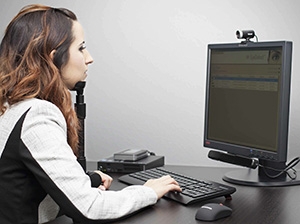Screen Refugees, Find Terrorists by Monitoring Eye Behavior, Says Lie Detection Tech Co.
Field tests show EyeDetect, a lie detector that monitors eye behavior, is 85 percent accurate. The 30-minute test delivers results in five minutes, making it ideal for screening large groups quickly.

The U.S. needs a way to effectively screen Syrian refugees entering the country. A Utah company says its new lie detection technology is tried and tested, and available to implement now.
LEHI, Utah – Dec. 22, 2015 – A Utah technology start-up says its new lie detection technology called “EyeDetect” is what the U.S. government needs to quickly screen Syrian refugees and foreign nationals. The company, Converus, was in Washington, D.C. earlier this month and demonstrated the solution to officials from the FBI, State Department, Secret Service, Department of Defense, National Security Agency, National Center for Credibility Assessment, armed forces and others, as well as to several members of Congress.
EyeDetect uses an infrared eye tracker to monitor involuntary eye behavior — such as pupil dilation, blink rate and fixations — to detect deception while a person answers true/false questions on a computer screen. The test takes 30 minutes and provides a “truthful” or “deceptive” score in less than five minutes. Polygraph exams, the long-time standard for lie detectors, require a trained examiner, take at least 90 minutes and reports can sometimes take hours to receive.
Field tests show EyeDetect is 85 percent accurate. When used in conjunction with the polygraph, and when both tests have the same result, accuracy reaches almost 98 percent.
Companies and governments throughout Central and South America have been using this solution for pre-employment screening of job candidates and periodic testing of current employees since late 2014. Now Converus has turned its focus on the U.S. market, claiming it’s not only ideal for screening job candidates in government, law enforcement and corrections, but also visa applicants, immigrants, and parolees. The Salt Lake City Police Department is one of Converus’ first U.S. customers.
With 100,000 Syrian refugees currently in the U.S., and plans to admit 10,000 more by the end of 2016, there is increasing fear over the ability of the U.S. government to properly vet such a large number of refugees to prevent terrorists from infiltrating the country. Two terrorists, linked to the recent Paris attack, were arrested in a refugee camp last weekend near Salzburg, Austria.
“We do have to be concerned about the possibility that a terrorist organization may seek to exploit our refugee resettlement process,” said Homeland Security Secretary Jeh Johnson.

EyeDetect, a new lie detection technology that monitors eye behavior to detect deception, can help screen Syrian refugees for terrorists trying to infiltrate the U.S.
“Everyone is talking about the need to vet refugees, but no one has a viable solution — especially for effectively screening large groups of people who don’t have any personal identification records,” said Converus President and CEO Todd Mickelsen. “We’re confident the U.S. government will see this technology can help keep our country safe by solving this very serious, urgent problem. EyeDetect has been tested, it works, and it’s available to implement immediately.”
According to Mickelsen, the EyeDetect exam would address such questions as: “Have you committed any acts of terrorism?” “Do you have ties to ISIS or al Qaeda or any other terrorist organizations?” or “Is your intention for entering the country to commit an act of terrorism?”
“San Bernardino terrorist Tashfeen Malik passed three U.S. government background interviews before receiving a visa. Had an EyeDetect test been administered at the beginning of the application process, she likely would have been identified and rejected before having background interviews. Using EyeDetect for the initial screening will save valuable time, resources and money that would otherwise be spent doing background checks,” said Mickelsen.
Mickelsen pointed out the need to be vigilant in screening all refugee family members who could potentially be radicalized. Previously, it was thought women and children posed less risk. But in light of Malik, a wife and mother of a 6-month-old daughter — coupled with reports ISIS, or Daesh (another name for ISIS), purportedly possesses a government passport printing system — he says it’s more crucial than ever to implement a more effective screening system.
The House Oversight Committee held a hearing Dec. 17 to determine what can be done to improve the refugee vetting process. The FBI is already investigating hundreds of terror suspects spread throughout all 50 states.
A team of scientists from the University of Utah developed the EyeDetect technology over the course of 10 years. For more information, visit www.converus.com.
# # #
About Converus
Converus (“with truth”) is committed to providing trustworthy credibility assessment solutions. Its flagship product, EyeDetect® — a product first conceived in 2002 — is the first ocular-motor deception detection solution. It’s an accurate, cost-effective, efficient, secure and nonintrusive method that detects deception in 30 minutes by analyzing eye behavior. The same scientists credited with computerizing the polygraph in 1991 developed EyeDetect. It’s a new way for organizations to manage risk and ensure workplace integrity, and for law enforcement agencies and governments to detect deception. Ultimately, it helps protect countries, corporations and communities from corruption, fraud and threats. The company is headquartered in Lehi, Utah, USA. For more information, visit www.converus.com.
_____________________________________________
Press Contact: Jeff Pizzino, APR / +1 480.606.8292

